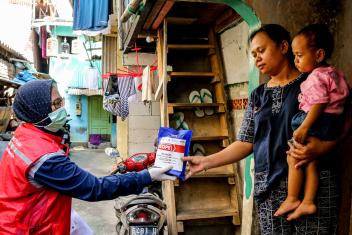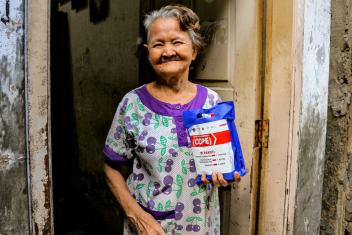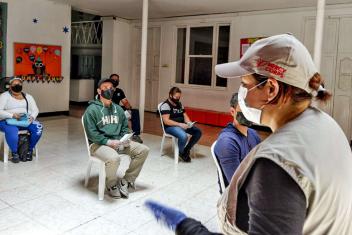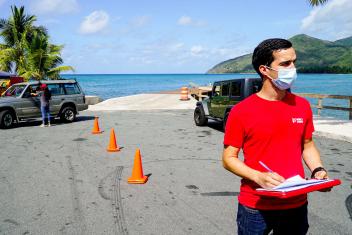5 ways we rose together in 2020
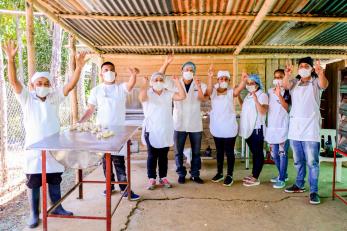
Even in a year that felt like every day brought a new crisis, we were able to make an impact for millions of families around the world — and your support was a vital part of that.
You helped us reach nearly 37 million people in more than 40 countries this year.
In partnership with our global team members and the people we serve, you helped us do so much this year. We have come together as a global community of humanitarians and continued to build a future where everyone can thrive.
Let’s take this moment to celebrate the impact we’ve made in 2020. Together, we helped families already in crisis cope with COVID‑19.
This year, families around the world have been affected by the COVID‑19 pandemic, but none so much as those in the communities we serve, who are already facing conflict, displacement, poverty and limited access to essential services. With your support, we were able to quickly adapt our programming to address the immediate and long-term impacts of the disease and help people who were already struggling through crises to survive and thrive.
Since the onset of the COVID‑19 pandemic, we’ve reached more than 15 million people in 34 countries with handwashing stations, hygiene kits, sanitation training and public education campaigns to help slow the spread of the virus. In the Democratic Republic of Congo, we found new ways to assist more than 21,000 displaced families during the pandemic — from placing hand-washing stations in Iga Barriere to using wireless technology to scan the ID cards of those coming to receive aid while maintaining a healthy distance. And, with a little creative problem solving in Timor-Leste, we helped slow viral spread while supporting climate change goals by deploying 34 handwashing stations made from locally recycled plastic bottles.
In addition to these immediate needs, we implemented an economic resilience and recovery strategy that allowed us to help communities around the world. In the Bahamas, where many businesses were already struggling post Hurricane Dorian, we responded to the economic shutdown brought on by COVID‑19 by providing $750,000 (£560,000) of emergency relief grants to 284 micro, small and medium enterprises. In Colombia, we provided cash support for informal workers — typically the first and hardest hit group when crisis strikes. And, through our MicroMentor programme, we activated a COVID‑19 mentor task force to support entrepreneurs who needed guidance in everything from finding emergency financial support to pivoting operations to align with COVID‑19 safety guidelines.
Together, we gave farmers more tools to adapt to climate change
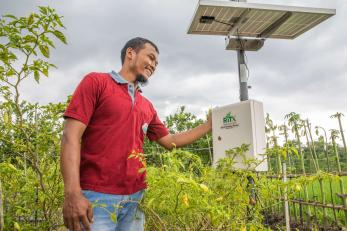
The climate crisis is a fact of life for millions of the people we work with around the world, particularly for farmers who rely on the land to support themselves, their families and their communities. Because of your support, our programmes have connected farmers in even the world’s most rural communities with global expertise and new information on climate change and its effects. In fact, you helped us reach more than 6 million people through our agricultural programmes this year in so many ways.
By strengthening the global reach of our AgriFin programme, we connected small-scale farmers — who feed 80 per cent of people in lower-income countries — to data from NASA satellites. Farmers around the world can access this hyper-local data right from their mobile phones and use the information to implement climate-smart agricultural practices.
In Indonesia, where farmland is fertile but the changing climate is challenging traditional agricultural methods, we worked with farmer groups to introduce new practices and technologies to boost productivity and income.
We also developed new models of funding to give farmers incentives to shift to more sustainable agricultural practices, and provided training in modern farming practices to help them produce more, earn more and feed more people.
Together, we helped young people start building their futures
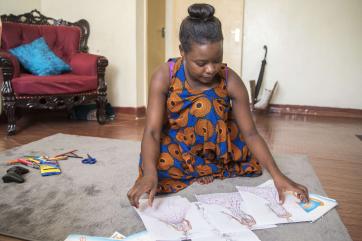
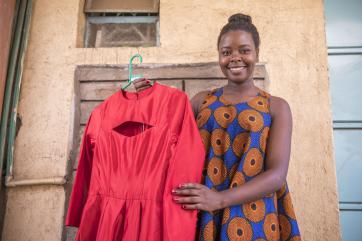
When connected to the right opportunities, young people have the power to be a positive force for change. And this year, you helped us empower them to shape the future they deserve.
For example, in East Africa and Jordan we supported young tech innovators as they brought their ideas to life in the form of apps and other technology platforms, generating income for themselves and their new employees. In Nigeria, we established partnerships with 190 local businesses, institutes and artisans to provide vocational training to more than 2,500 out-of-school girls and helped 1,501 out-of-school girls get access to financial services, such as bank accounts and loans.
In the wake of the COVID‑19 pandemic, young people around the world were challenged to continue their education in the midst of lockdowns and social distancing measures. As a result of your support, our teams were able to take action to help students keep learning. Like in Iraq, where we worked with the Ministry of Education to create policy and procedures that enabled national examinations for 450,000 students to continue, in spite of COVID‑19 related lockdowns, keeping their education on track for the future.
Together, we found innovative ways to remove barriers
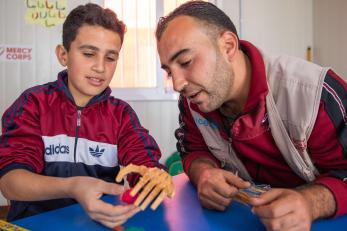
As a member of the Mercy Corps community, you know that when we’re faced with a problem that has no existing solution, we invent one. And this year, we helped people push through incredible challenges by finding new solutions and removing obstacles through technology and creative problem solving.
In Jordan's Za'atari refugee camp — which has sheltered Syrian refugees since 2012 and has become the largest Syrian refugee camp in the world — many refugees with disabilities can’t afford or don’t have access to the equipment they need. So we’re using 3D printing technology to build, repair and maintain accessibility equipment, including prosthetics, to help improve lives and open opportunities.
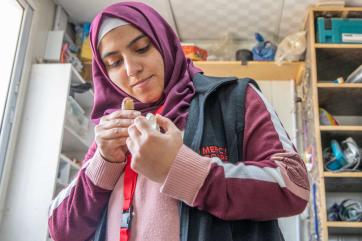
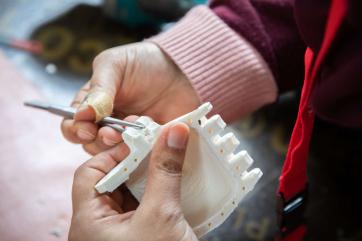
In Palestine, one of our leading tech education and empowerment programmes brought together thousands of innovators to tackle the COVID‑19 crisis with a virtual hackathon. The result? Real tech solutions for reducing the impacts of COVID‑19 and supporting new ways of living in the wake of the disease.
And in the U.S.A, we created an investment vehicle for 170 families who live in economically underprivileged and racially diverse neighbourhoods in Portland, Oregon, the city that is home to our global headquarters. Families invest between $10 to $100 per month in shared ownership of a commercial, neighbourhood property and receive yearly dividends. For the vast majority of these investors, this is the first opportunity they’ve had to build wealth.
Together, we responded to emergencies above and beyond COVID‑19
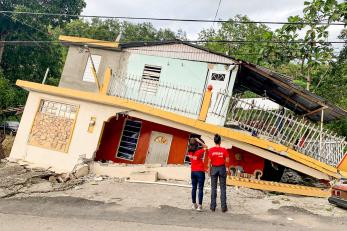
We have always been one of the first international organisations to respond after a disaster hits, particularly in communities already impacted by poverty and oppression. With the help of our supporters, we’ve been able to deliver lifesaving aid and supplies to communities devastated by natural disasters for the last four decades. And this year was no different. Our global teams were active around the world, responding to emergencies above and beyond COVID‑19.
In East Africa, where the worst outbreak of desert locusts in 70 years threatened to decimate rangeland and farmland, we provided food and cash, as well as information and initiatives that allowed local people to monitor the status of the outbreak.
When floods devastated areas of Africa and Asia, we were there to provide household supplies, cash and clean water to thousands of families. In Haiti, we distributed emergency cash to help families affected by Hurricane Laura buy the supplies they needed most. And in Beirut, after massive explosions destroyed small businesses across the city, we provided cash assistance to help business owners rebuild, reopen and keep people employed.
Together, we’re building a future where everyone can thrive
With your support, we’ve helped communities around the world push back against crisis for more than 40 years. Even in a year marked by one challenge after another, our team members, partners, programme participants and supporters like you still found ways to build a brighter future in the most fragile places around the world.
But we have more work to do. COVID‑19, climate change, injustice and inequality are the global challenges of our time. While these problems continue to affect everyone in every community, they are exceedingly difficult to overcome for people already struggling with poverty, food shortages, oppression and lack of opportunities. So let’s roll up our sleeves and get to work on what’s next. Together.
To help our teams continue transforming lives and lifting up communities, make a monthly contribution toward lasting impact and become a Champion of Change.
